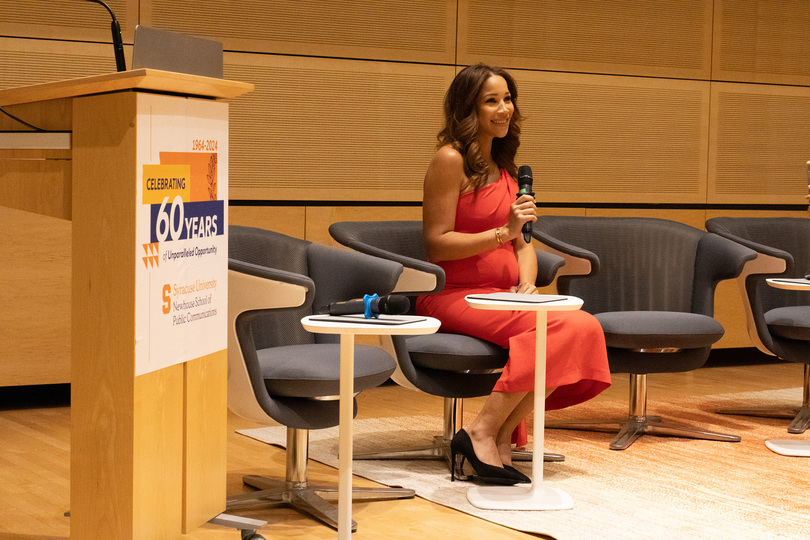‘Latinas in Media’ addresses barriers in the media industry

While recognizing the event as an opportunity to highlight Latinas in a predominately white field, Ortiz said it was an important demonstration of the many different forms success can take. Henry Zhang | Staff Photographer
Get the latest Syracuse news delivered right to your inbox.
Subscribe to our newsletter here.
Jade Aulestia, a Syracuse University senior, said that while diversity, equity, inclusion and accessibility were frequently discussed in media and academic spaces, these conversations rarely led to meaningful change.
This observation led Aulestia, president of the SU Chapter of the National Association of Hispanic Journalists, to help organize and moderate Wednesday night’s “Latinas in Media,” panel event, featuring five Latina media professionals.
The women, four of whom are alumnae of the S.I. Newhouse School of Public Communications, discussed the barriers they’ve faced across the journalism, public relations and photography industries and offered advice for students entering communications professions. The event was hosted in collaboration with SU’s Student Association and was part of its Multicultural Week programming.
“My four years here, there’s never really been an event like this,” Aulestia said. “In terms of Women’s History Month and Multicultural Week, we were like, ‘Latinas in Media is really cool.’ Combining two different groups of minorities and having them all represented was really nice.”
Throughout the event, panelists also acknowledged the challenges of organizing a DEIA-focused event amid the Trump administration’s ongoing pressure campaign to remove DEIA initiatives from higher education.
One panelist, Isabel Sánchez, a reporter for NBC10 and Telemundo 62 in Philadelphia, said it was inspiring to hear from her fellow Latinas in a space like Newhouse, especially as an alumna, despite the ongoing DEIA backlash.
“When diversity is being looked at as something terrible, having the space to have conversations like this is really important,” Sánchez said. “It’s not like, ‘Oh, look at me. Poor me. I’m a little brown girl.’ It’s about my experiences (that) might be different. So having the space to talk about them, I think is really helpful.”
While their experiences varied, the panelists discussed similarities in their careers, especially regarding the challenges of being taken seriously in spaces dominated by white and male coworkers.
Mimi Alas, a content producer and entertainment journalist, described her path to finding her voice as an immigrant from El Salvador while navigating the pressures of securing stable work in the United States to maintain her visa. But last year, however, marked a positive shift in her attitude.
“I was like, ‘Whatever, I’m just going to speak my mind,’” Alas said. “I think that you can speak your mind and say what you want to say without crossing boundaries, without disrespecting people. And I feel like that has helped me to now be more comfortable with who I am.”
Despite these challenges, the panelists also reflected on their major career successes.
Domenica Martin said she had been passed up for promotions and fair compensation while her white and male coworkers advanced, which she described as challenging.
When she spoke to her boss about her concerns, she said she got a sarcastic response in return: “Why don’t you start your own company?”
Martin took her boss’s advice and has since started her own public relations firm. She said she was satisfied proving her doubters wrong.
Estheralice López recalled feeling immense fear after switching her major from health and exercise science to photography while studying at SU. She got emotional recalling her mother’s faith in her throughout the whole transition.
She is now an assistant photo editor at the National Geographic Society, which she said validates her mother’s support.
Arlety González, an award-winning journalist, echoed this sense of pride, highlighting her opportunity to cover the U.S.-Mexico border during an election year. She encouraged other Latinas to have faith that, with hard work and dedication, they too can achieve their professional goals.
“I always say … if they don’t let you through the door, then just find your way through the window,” González said.
Luisana Ortiz, a former president of SU’s NAHJ Chapter and one of the panel’s student organizers, said hearing the panelists’ highs and lows was validating as a Latina who has struggled to retain her identity at SU. She said it was especially meaningful as someone hoping to follow in their footsteps in the media industry.
While recognizing the event as an opportunity to highlight Latinas in a predominately white field, Ortiz said it was an important demonstration of the many different forms success can take. Aulestia expressed hope the event will continue to inspire future generations and support the growth of Latina members in the media.
“I just hope (students) are seeing themselves in our panelists and are seeing that representation … and that there’s someone out there that looks like you and is looking out for you at every step of the way,” Aulestia said. “And for those that don’t see themselves, (they can) see that these people are just as cool and be a part of helping with that representation.”
Disclaimer: Luisana Ortiz formerly worked as an assistant news copy editor for The Daily Orange. She did not influence the editorial content of this article.





